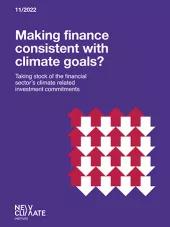As of July 2023, 37 of the world's largest 50 asset managers, 24 of the largest 50 asset owners, and 33 of the largest 50 banks have committed to net zero portfolio targets.
There are questions with regard to the impact of net zero portfolio targets in driving financial institutions’ climate action and how that relates to decarbonising the real economy. We focus on the world’s 50 largest asset managers to underpin our analysis. We assess the integrity of net-zero portfolio commitments and compare it to a set of qualitative and quantitative metrics indicative of the financial institution’s climate action.
As they are, most of the analysed net zero portfolio commitments are unlikely to achieve what they intend or purport to – net zero real-world global emissions by mid-century. In most cases, net zero portfolio targets do not represent a shift towards serious climate action at the financial institution.
Intensity-based sectoral targets may help reduce portfolio risk but are not particularly effective in supporting financial decision-making to drive a low-carbon transition. The same may also be true for absolute targets, where the underlying portfolio composition is changing without comprehensive re-baselining.
Given the short-term focus of many investors and the long-term nature of financial institutions’ net zero portfolio targets, it is questionable if such targets meaningfully contribute to reaching international climate goals. Short termism remains a barrier to drive comprehensive collective action.
Instead, we recommend that financial institutions focus on supporting the transition of economies and economic actors by identifying, engaging, building coalitions to advocate for, and systematically supporting actors transitioning to more sustainable business models. Financial institutions should have an intrinsic interest in helping economies transition and contribute to net zero – especially universal owners, that hold large amounts of, and diverse, assets under management.
More stringent oversight policies are needed to prevent greenwashing and avoid fragmented and ineffective climate action without any collective vision.




